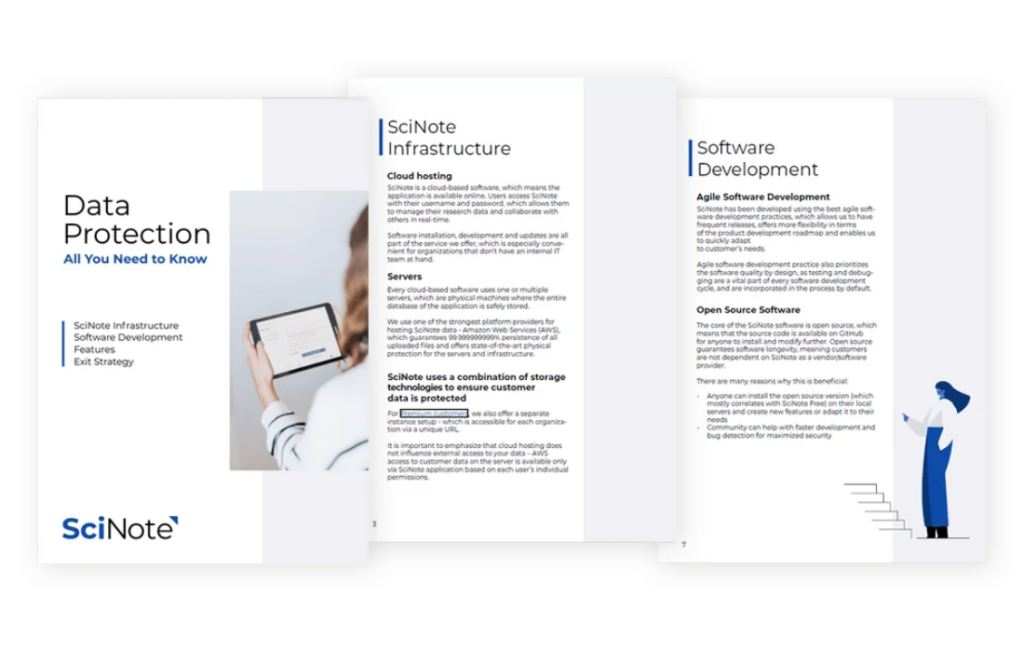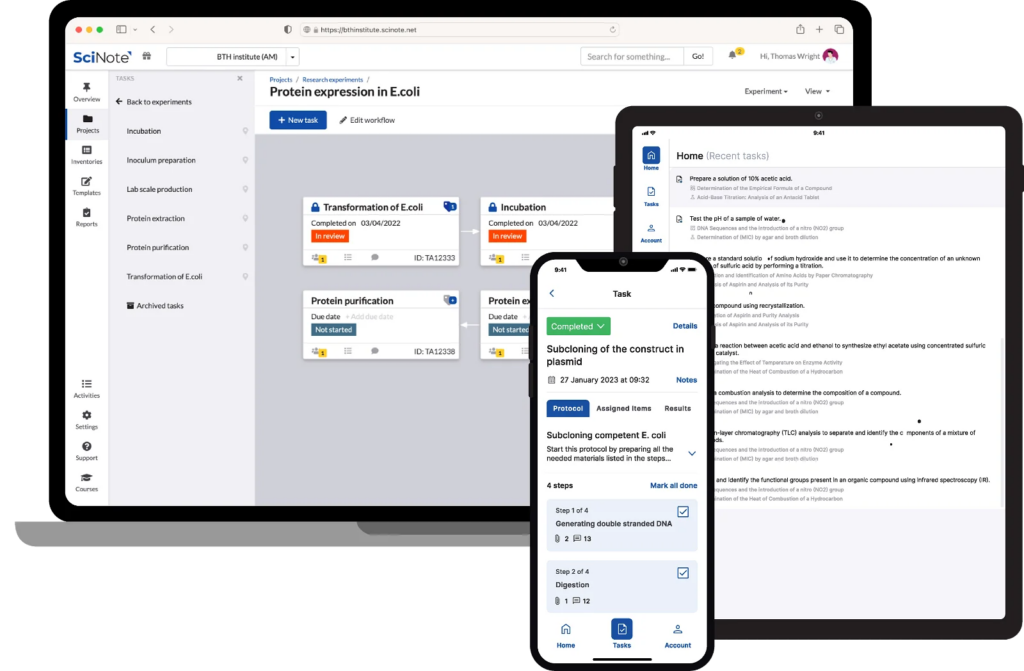Effective documentation and data management are essential for success in the field of scientific research. Electronic lab notebooks, or ELNs, have revolutionized how scientists keep track of their experiments, organize data and work together. Choosing between a local electronic lab notebook and one that is cloud-based is a big decision that researchers have to make. Each alternative has benefits and drawbacks, and choosing the best one may have a big influence on how productive and efficient your research is.
In this blog post, we will delve into the key features and benefits of both cloud-based and local ELNs to help you make an informed decision.
Cloud-Based Electronic Lab Notebooks
Cloud-based electronic lab notebooks, also known as web-based ELNs, are digital platforms hosted on remote servers, accessible through the Internet. These platforms offer a range of benefits that have made them increasingly popular among researchers. Here are some of the key advantages of using a cloud-based SciNote ELN – Electronic Lab Notebook:
Accessibility and Collaboration
One of the most significant advantages of cloud-based ELNs is accessibility. Researchers can access their notebooks from anywhere with an internet connection, which means that they are not tied to a specific physical location. This remote access allows for seamless collaboration among researchers in different geographic locations. Team members can easily view, edit, and share data, fostering effective communication and teamwork.
Data Security
Cloud-based ELNs typically offer robust security measures to protect your data. Reputable providers implement encryption, regular data backups, and strict access controls to safeguard sensitive research information. This can provide peace of mind, knowing that your data is stored securely and is less susceptible to physical damage or loss.
Scalability
Cloud-based ELNs are highly scalable, making them suitable for research groups of all sizes. You can easily add new users, storage, or features as your research needs evolve. This flexibility ensures that your ELN can grow with your research team, without the need for significant hardware or software upgrades.
Automatic Updates
Cloud-based ELN providers regularly release updates and enhancements to improve their platforms. These updates are typically applied automatically, ensuring that your ELN is always up to date with the latest features and security patches. This eliminates the need for manual maintenance and reduces the risk of using outdated software.
Cost-Efficiency
Cloud-based ELNs are often cost-efficient, particularly for smaller research teams. They eliminate the need for investing in expensive on-premises infrastructure and IT support. Additionally, subscription-based pricing models allow you to pay only for the resources and features you need, making it a cost-effective choice for many researchers.

Local Electronic Lab Notebooks
Local electronic lab notebooks, as the name suggests, are software applications installed on a local server or individual computers within a research laboratory. While they have been the traditional choice for many years, they still offer a range of benefits that make them a viable option for certain research environments. Here are some of the advantages of using a local ELN:
Data Control
One of the primary advantages of local ELNs is the level of control you have over your data. Because the data is stored on your servers or computers, you can implement custom security measures and access controls to align with your specific research requirements. This can be crucial for highly sensitive or confidential research projects.
Offline Access
Local ELNs do not rely on an internet connection for access, which can be advantageous in situations where internet connectivity is unreliable or when working in remote locations. Researchers can continue to work on their notebooks even without an internet connection, ensuring uninterrupted research progress.
Data Privacy and Compliance
In some research fields, such as healthcare and pharmaceuticals, strict regulations govern the handling of data. Local ELNs offer more control over compliance with industry-specific data privacy regulations, as you can manage your data within your secure environment.
One-Time Cost
While local ELNs may require an initial investment in hardware and software, they do not entail ongoing subscription costs like cloud-based ELNs. For research teams with a fixed budget, this cost structure may be more appealing in the long run.
Customization
Local ELNs can often be customized to a greater extent than cloud-based solutions. Researchers can tailor the software to meet their specific needs, including integrating it with other laboratory instruments and software systems.
Choosing the Right Solution
The decision between a cloud-based and a local electronic lab notebook should be based on your research needs and priorities. To help you make an informed choice, consider the following factors:
Research Environment
Assess the nature of your research environment. If you work in a collaborative setting where researchers are geographically dispersed, a cloud-based ELN may be the most efficient choice. Conversely, if your research requires strict data control and compliance, a local ELN might be more suitable.
Budget
Evaluate your available budget and the long-term cost implications. Cloud-based ELNs often involve ongoing subscription fees, while local ELNs require an upfront investment. Consider which model aligns better with your financial resources.
Internet Connectivity
Consider the availability and reliability of internet connectivity in your laboratory or research locations. If you frequently experience connectivity issues, a local ELN may be the more reliable option for ensuring uninterrupted work.
Data Security
Assess the sensitivity of your research data and the required security measures. Local ELNs provide greater control over data security, but cloud-based solutions often have robust security measures in place. Choose the option that best aligns with your data protection needs.
Compliance Requirements
If your research is subject to specific industry or regulatory compliance standards, evaluate the level of control and customization required to meet these standards. Local ELNs may be better suited for ensuring compliance in some cases.
Scalability
Consider your growth expectations. If your research team is likely to expand, a cloud-based ELN’s scalability may be more convenient and cost-effective than continually upgrading your local infrastructure.

Final Thoughts
Both cloud-based and local electronic lab notebooks have their advantages and are valuable tools for managing research data and collaboration. The choice between the two ultimately depends on the specific needs and priorities of your research team. Consider the accessibility, data security, cost, and customization requirements, and make an informed decision that will enhance the efficiency and productivity of your research endeavors. Whether you opt for a cloud-based or local ELN, the key is to select a solution that empowers your research and supports your scientific goals.
Equipped with a Bachelor of Information Technology (BIT) degree, Lucas Noah stands out in the digital content creation landscape. His current roles at Creative Outrank LLC and Oceana Express LLC showcase his ability to turn complex technology topics into engaging, easy-to-understand content for their websites.
Lucas specializes in writing technology guides. His work is distinguished by its clarity and relevance, making daunting tech subjects accessible and interesting to a broad audience. His guides are not just informative but are a testament to his skill in bridging the gap between technical expertise and everyday usability.
In addition to his tech-focused articles, Lucas has a keen eye for capturing the essence of his surroundings. His writing transcends technology, as he effortlessly brings to life various observations and experiences in his articles. This versatility not only demonstrates his wide-ranging interests but also his ability to connect with readers on multiple levels.
Lucas Noah’s writing is a fusion of technical acumen and a deep appreciation for the world around him, offering readers a unique and insightful perspective on both technology and life.





